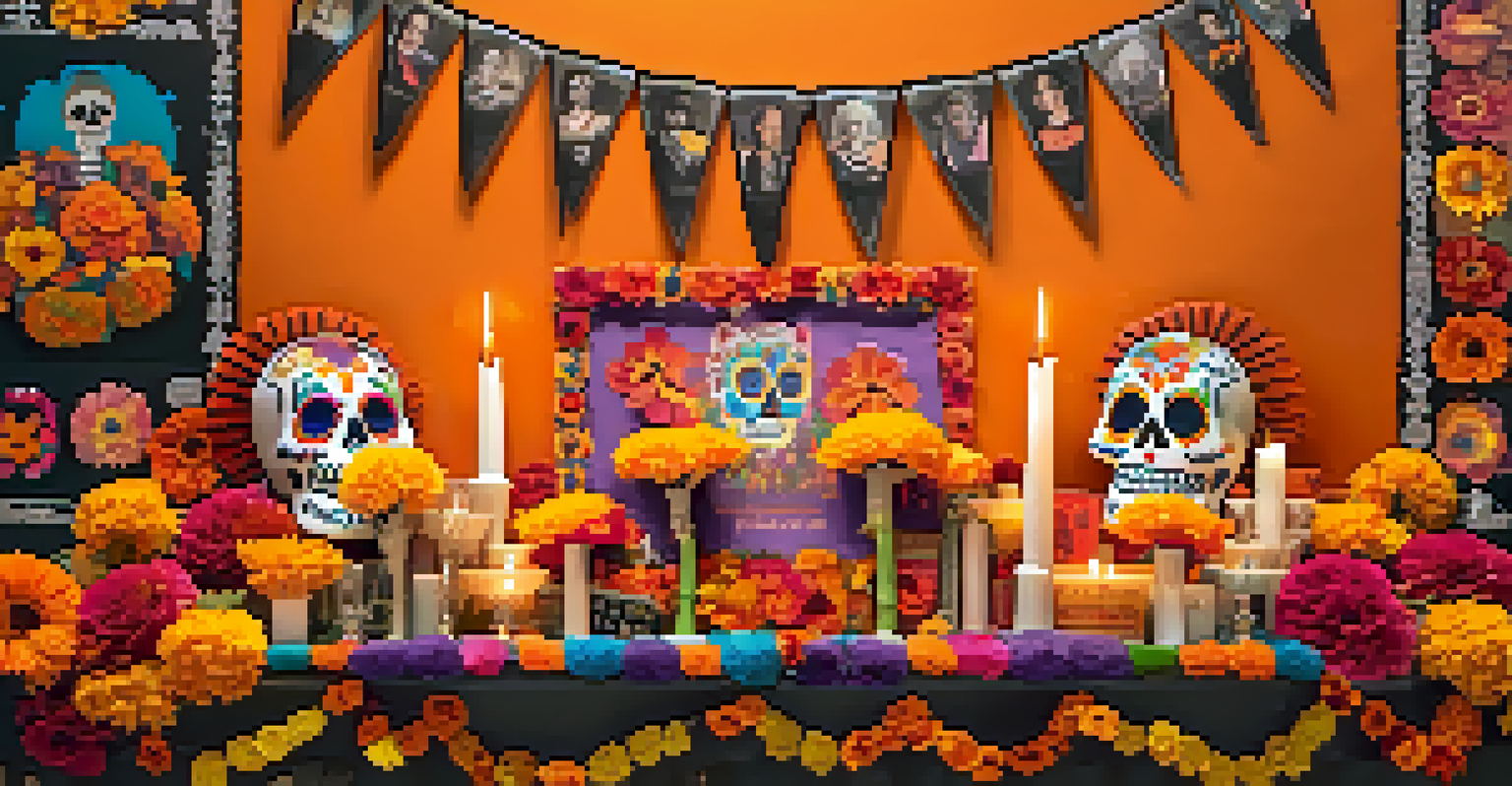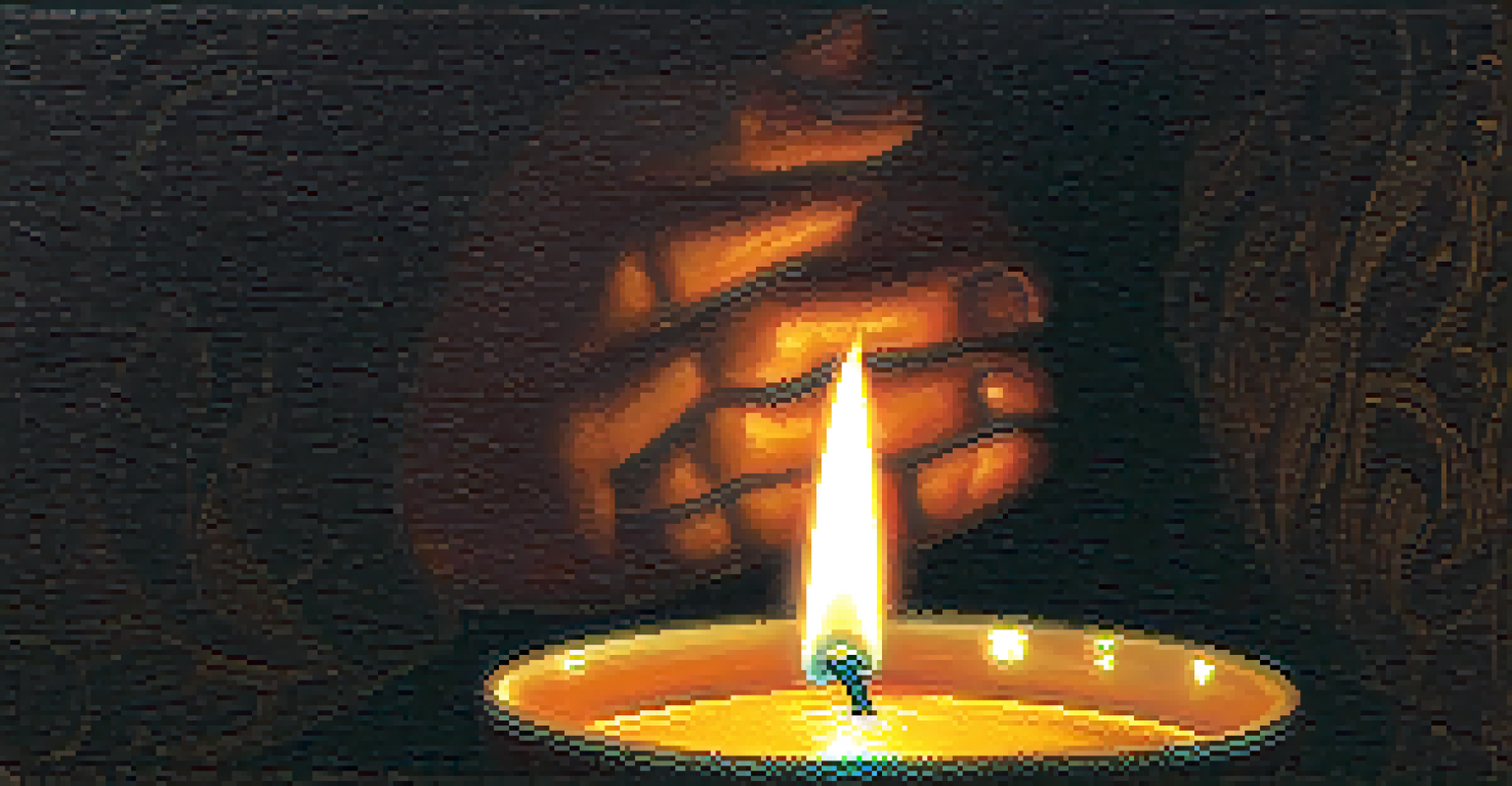How Spiritual Beliefs Shape Attitudes Toward Death

Understanding Spiritual Beliefs and Their Impact
Spiritual beliefs encompass a wide range of perspectives, from organized religion to personal philosophies. These beliefs often provide individuals with a framework for understanding life's mysteries, including death. By exploring these views, we can see how they shape attitudes toward mortality, influencing everything from fear to acceptance.
Death is not the opposite of life, but a part of it.
For many, spirituality offers comfort during life's inevitable transitions. This comfort can manifest in various ways, such as rituals, prayers, or meditative practices that help individuals process grief. As a result, those with strong spiritual beliefs may find themselves more equipped to cope with the death of a loved one or their own mortality.
Additionally, spirituality can promote a sense of connection to something greater, whether that’s a divine entity or the universe itself. This connection can alleviate the fear of death, as individuals may believe in an afterlife or a cycle of rebirth. Ultimately, understanding these beliefs can help us appreciate the diverse ways people approach the concept of death.
Cultural Variations in Spiritual Beliefs About Death
Different cultures have unique spiritual beliefs that significantly shape their attitudes toward death. For instance, in many Eastern cultures, concepts like reincarnation and karma influence how life and death are perceived. This cultural lens often fosters a more accepting attitude towards death, viewing it as a natural part of an ongoing cycle rather than an end.

Conversely, Western cultures often emphasize individualism and the finality of death, which can lead to fear and anxiety. The Christian belief in an afterlife, however, can provide hope and comfort to many. Understanding these cultural variations helps us see that attitudes toward death are not universal but rather deeply rooted in spiritual contexts.
Spirituality Shapes Death Attitudes
Spiritual beliefs provide frameworks that help individuals cope with mortality, influencing their acceptance and understanding of death.
These cultural beliefs are often expressed through rituals and customs surrounding death. For example, the Day of the Dead celebration in Mexico honors deceased loved ones with joy and remembrance, showcasing a perspective that celebrates life even in death. Such practices highlight how spiritual beliefs can shape not only personal attitudes but also communal responses to mortality.
The Role of Religion in Shaping Death Views
Religion plays a pivotal role in shaping how individuals understand and cope with death. Major world religions, such as Christianity, Buddhism, and Islam, provide followers with teachings about what happens after death, offering frameworks for hope and assurance. These teachings can significantly influence how adherents approach the death of loved ones or their own impending mortality.
To fear death is to misunderstand the nature of life.
For instance, Christians often find solace in the promise of eternal life, which can lessen the fear associated with death. Similarly, Buddhists focus on the impermanence of life, encouraging acceptance and mindfulness in the face of mortality. By embedding these beliefs into daily life, individuals can cultivate a healthier perspective on death.
Moreover, religious communities often provide support during times of grief, reinforcing the idea that one is not alone in their suffering. This sense of belonging can be incredibly comforting, transforming the experience of loss into an opportunity for connection and reflection. Thus, religion not only shapes individual beliefs but also fosters communal support systems around death.
Personal Spirituality and Attitudes Toward Death
Personal spirituality, which may or may not align with organized religion, also significantly influences attitudes toward death. Many individuals find meaning in their personal beliefs, which can include nature, the universe, or a sense of inner peace. This individualized approach often leads to a more nuanced understanding of death, free from traditional dogmas.
For example, someone who identifies as spiritual but not religious may view death as a transition rather than an end. This perspective can foster a sense of peace and acceptance, allowing individuals to focus on celebrating life rather than fearing death. Personal spirituality often encourages reflection and personal growth, enriching one’s life experience.
Cultural Views Influence Death Perception
Different cultures possess unique spiritual beliefs that shape their attitudes toward death, affecting how they process grief and loss.
Furthermore, personal beliefs can lead to unique expressions of grief and remembrance. Whether through art, meditation, or connecting with nature, individuals may find meaningful ways to honor their loved ones. In this way, personal spirituality becomes a crucial factor in how individuals process death and their own mortality.
The Psychological Impact of Spiritual Beliefs on Death
Spiritual beliefs can have profound psychological effects on how individuals perceive and cope with death. Studies have shown that those with strong spiritual convictions often experience lower levels of anxiety and depression related to death. This reduction in fear can lead to a more fulfilling life, as individuals may prioritize meaningful experiences over worries about the end.
Additionally, spiritual beliefs can provide a sense of purpose, guiding individuals through the challenges of life and death. This sense of purpose often translates into a more positive outlook, encouraging people to embrace life’s fragility. As a result, individuals may engage in practices that promote emotional well-being, such as mindfulness and gratitude.
Moreover, the psychological benefits of spirituality extend beyond personal attitudes toward death. These beliefs can foster resilience, enabling individuals to bounce back from loss with strength and hope. By integrating spiritual practices into their lives, individuals can cultivate a mindset that not only accepts death but also sees it as an integral part of life's journey.
Rituals and Their Significance in Death Perception
Rituals play a crucial role in how spiritual beliefs shape attitudes toward death. They provide structured ways to express grief, celebrate lives, and connect with the spiritual realm. Whether through funerals, memorial services, or personal ceremonies, these rituals help individuals navigate the complex emotions associated with death.
For instance, a traditional funeral may offer closure and a chance for community support, while personal rituals, like lighting a candle or creating a memory box, can provide a sense of connection to the deceased. These practices often reflect the spiritual beliefs of those involved, emphasizing the importance of honoring life’s transitions.
Rituals Enhance Grieving Processes
Rituals rooted in spiritual beliefs play a crucial role in expressing grief and connecting with the deceased, fostering community support.
Moreover, rituals can serve as a reminder of shared beliefs and values within a community. They create a sense of belonging and continuity, reinforcing the notion that death is not just an individual experience but a collective one. Through these shared practices, individuals can find comfort, understanding, and a renewed perspective on mortality.
Finding Peace with Death Through Spiritual Exploration
Spiritual exploration can be a powerful tool for finding peace with the concept of death. By engaging with various spiritual practices, individuals can develop a deeper understanding of their beliefs and attitudes. This journey often leads to greater acceptance of mortality and a more profound appreciation for life.
For many, exploring spirituality might involve reading sacred texts, attending workshops, or connecting with like-minded individuals. These experiences can encourage personal reflection and provide insights into how others navigate their beliefs about death. Such exploration helps individuals cultivate a sense of agency over their understanding of mortality.

Ultimately, finding peace with death is a deeply personal journey shaped by spiritual exploration. As individuals learn more about their beliefs and values, they can embrace the inevitable with grace and understanding. This transformative process not only enriches their relationship with death but also enhances their overall quality of life.